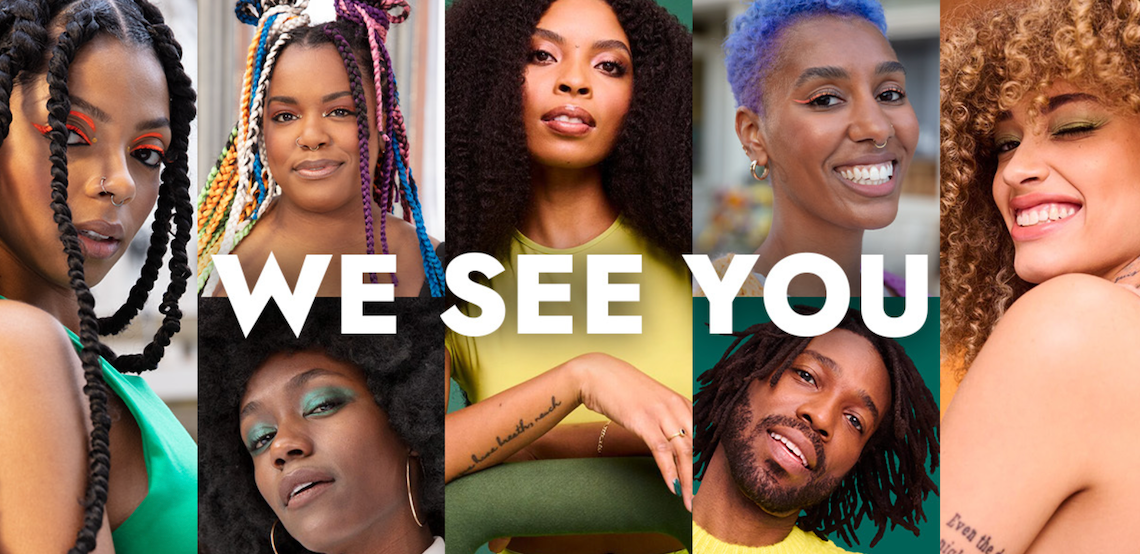In honor of Black History Month, Sally Beauty is celebrating Black hair and joy.
The month-long campaign, launched on February 1 and called We See You, celebrates inclusivity through founder spotlights on social media, in-store signage and dedicated space on e-commerce. The campaign video features multiple BIPOC models with different hair textures, curls and colors, in various moments of repose and joy, styling their hair or showing off their hair style. Overlaying these images is text that reads, “We see you. If you have textured hair, you’ve heard. Supporting Black-owned brands and pro-quality products for 20 years.” Additionally, the ad includes audio snippets of questions often posed to people with textured hair, like “Is your hair real?” or “Can I touch it?” Those are followed by responses like, “That’s my hair business,” and “Like a work of art, no touching.”
“The sense of community, love and acceptance is a big component of this campaign. It also highlights our authority in the space, as Sally Beauty has cultivated and brought different texture brands to market for over 20 years,” said Carolyne Guss, CMO of Sally Beauty.
Guss pointed out that Sally Beauty retails over 100 textured hair brands, 54% of which are Black-owned and founded. It was also the first retail partner for buzzy textured hair brands like Eden Bodyworks and Mielle Organics, , the latter of which sold to P&G in late 2022 for an undisclosed sum. Sally Beauty’s core customers are typically women of color. In 2019, at least 30% of its hair-care sales were textured-hair products, according to previous Glossy reporting.
In addition to the video, Sally Beauty asked campaign models and influencers to write love letters to their own hair, which are being shared on the Sally Beauty e-commerce site and social media. For paid media, Sally Beauty is concentrating on Instagram and Facebook ads, and unpaid media placements on TikTok, YouTube and Instagram. Guss declined to share investment figures but called the campaign an important, full-funnel marketing initiative. QR codes in-store will drive consumers to a SallyBeauty.com landing page spotlighting Black founders, which will have rotating information on founders, products and love letters. Founders and brands include Monique Rodriguez from Mielle Organics, Janelle Stevens from Camille Rose, and Jesseca Dupart from Kaleidoscope, among others.
Sally Beauty Holdings net sales for the first quarter of fiscal year 2023 were $957 million, a decrease of 2.4% year-over-year, driven by 350 store closures and unfavorable foreign exchange impact. However, e-commerce sales increased 14% to $91 million, representing 9.5% of net sales.
“We’re focused on our loyal customers, as well as acquiring new customers through our marketing program, differentiated product offerings in professional color and care, and strategic initiatives,” said Denise Paulonis, CEO of Sally Beauty Holdings, on the company’s first-quarter 2023 earnings call Thursday. Sally Beauty maintains 17 million active loyalty members across U.S. and Canada, representing 77% of first-quarter sales.
Since 2020, numerous brands and retailers have increased their investment in BIPOC-owned or -founded brands. Some retailers, like Ulta Beauty and Sephora, committed to the 15 Percent Pledge to increase such brand representation on shelves. Others, like Urban Decay, have sought to amplify Black beauty experiences, sometimes without any direct product-tie-in. Digiday reported that companies, including beauty subscription box Ipsy, are extending their Black History Month marketing efforts beyond February.
As part of Sally Beauty’s campaign, the company will host a series of in-store and online promotions for textured hair products to drive top-line sales. On the earnings call, Paulonis said the company has not increased promotions in any meaningful way, but that Sally Beauty is leaning more into promotions when it can and that customers are looking for and taking advantage of promotions. According to Guss, to gauge the success of the “We See You” campaign, the company will measure the media impact and the extent to which its drives store and e-commerce traffic.
“[Our dedication to Black customers] isn’t something that we do and then walk away from after a short period of time. It’s an ongoing part of Sally Beauty,” said Guss.




